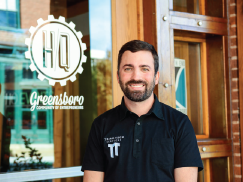
Prepare for Work
Whether you’re exploring careers or thinking about your next job, you’ll have questions about how you can get there (to a career) from here. You can factor in varied options for mapping your occupational route. In addition to education, jobs, and volunteer experiences that you’ve already had, check out these ways to get ready for work.
Experience Real Jobs
You can jump start your future career by “trying out” an occupation through work-based learning programs like those listed below. Your local school or college will offer some of these programs, and you can also seek out these opportunities online and by contacting community businesses and organizations.
Job Shadowing programs usually involve going to work for one or several days with someone whose career interests you. You can observe tasks and skills required for the job, experience the work environment, and interact with people who currently work in your potential career field.
Internships and Cooperative Education experiences usually last from a couple of weeks to several months. You observe individuals in your career field of interest while performing some of the job’s tasks and duties. Internships and Cooperative Education include mentoring by an experienced career professional who can discuss your career decisions and goals. Internships can be paid or unpaid, but Cooperative Education must provide pay. Either program may be eligible for academic credit at a high school or college.
School-Based Enterprises allow you to plan and run a simulated or actual business at school. It provides direct links between what you learn in the classroom and what it’s like to work in an actual job.
Apprenticeships offer combined academic instruction, structured training, and paid work experience that usually lasts for one to two years. Employers offer these programs in collaboration with the North Carolina Community College System.
Service Learning can be a great way to learn about a career and help your community while developing new skills or applying existing skills. You will see how the services you provide connect with what you’ve learned in classes.
Business/Industry Field Trips are opportunities to leave the classroom to see how what you’ve learned applies in workplaces. You can observe and investigate activities that relate to a specific school subject and to your career plans.
Work-based learning experiences give you the edge when applying for new jobs. You’ll gain valuable work experience and meet people who can become part of your career network. They may be your best resource for meeting potential employers and other people who can provide job referrals. These experiences can also improve the quality of your resume!
Work-Based Learning Stories
Michael Johnson
Pipefitter/Welder
Pipefitter Apprenticeship Program
"The Registered Apprenticeship program pushed me to become a pipefitter and learn all aspects of that trade."
"I took electronics in high school, and we took a tour of Keihin," Owens says. "I loved the electronics and robotics atmosphere. Now I'm getting lots of experience, taking the things I've learned in school and how it applies to the real world."
As a test intern in the engineering department, he started out building cables and testing electronics boards. That was more than a year ago, and Keihin supervisors say they're pleased with their partnership with ECC.
"(Owens) is a very capable person, and he is doing an excellent job," says Connie Hunt, Keihin human resources manager. Keihin hired Owens to work full time in a maintenance technical staff position while still completing his associate degree in manufacturing. "The variety of skills he is learning from the college is transferring over to us, and his problem-solving and learning ability is very high," Hunt says of Owens. "Based on the experience we had with him, we've also hired another intern, Kaitlyn Phillips, who is doing a great job as well."
Phillips is hoping for a full-time position at Keihin following completion of the Electrical Systems Technology diploma program. "I'm getting such a good foundation, and I'm learning a lot," Phillips says. "In addition to learning how to build cables and other processes, I'm learning responsibility. It's been a great experience, and I still have a lot more to learn."
Work-Based Learning Stories
Nick Dasnoit
Information Technology
Opportunity Greensboro Fellows Program
By Aleasha Vuncannon
"I was motivated from day one because of what the program had to offer."
Nick Dasnoit (’17) knew he wanted to major in Information Technology. It appealed to him as a stable and growing industry.
“I had taken classes at GTCC previously and was familiar with the college already. I liked the atmosphere, and it was more affordable,” he said. “I feel like the education is on par with a four-year university.”
While Nick was completing his final year at GTCC, he met Beth Mannella, program director for the Opportunity Greensboro Fellows Program.
The Opportunity Greensboro Fellows Program offers high-quality, paid internship opportunities to local college students. The students spend a summer gaining industry experience, exploring the city of Greensboro and participating in professional development opportunities.
The meeting was all it took to get Dasnoit interested in the program. He started working on his application that very day.
“I was motivated from day one because of what the program had to offer. It got you involved in the community,” he said.
He spent the summer interning with Global Brands Group, one of the world’s leading branded apparel, footwear and fashion accessories companies. The organization’s finance, order process management, and IT functions are based in Greensboro.
“I learned so much because I got immersed in their IT department. I did desktop support by going out on different floors and troubleshooting employees’ computer issues,” he said. “I really enjoyed it.”
Dasnoit feels his experience in the Opportunity Greensboro Fellows program further enhanced his GTCC education. By taking initiative and applying the networking skills he gained during the program’s professional development sessions, Nick secured his first job in IT in Greensboro.
“Nick was very vocal about staying in Greensboro and wanting to start his career here,” said Beth Mannella, program director of the Opportunity Greensboro Fellows Program. “I started thinking about who I knew that I could connect him with for an informational interview.”
Mannella encouraged Nick to contact Trey Miller, CEO of Triad Tech Services.
“Nick did an informational interview and really took the initiative to stay connected with Trey,” added Mannella. “When there was a job opportunity at Triad Tech Services, he was among those selected for an interview.”
It was a professional networking success with Dasnoit accepting a full-time position as a technician with Triad Tech Services in late 2017.
“We are a small company, and we are helping these other companies do good things. I enjoy going out and doing fieldwork with the clients,” said Dasnoit. “The Opportunity Greensboro Fellows Program was the icing on the cake. It set me up for success.”

 Photo credit Carrie Lilly
Photo credit Carrie Lilly